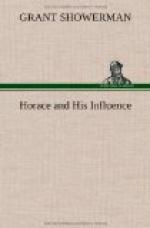Yet skepticism would be without warrant. The presence of any subject in an educational scheme represents the sincere, and often the fervent, conviction that it is worthy of the place. In the case of literary subjects, the nearer the approach to pure letters, the less demonstrable the connection between instruction and the winning of livelihood, the more intense the conviction. The immortality of literature and the arts, which surely has been demonstrated by time, the respect in which they are held by a world so intent on mere living that of its own motion it would never heed, is the work of the passionate few whose enthusiasms and protestations never allow the common crowd completely to forget, and keep forever alive in it the uneasy sense of imperfection. That Horace was preserved for hundreds of years by monastery and school, that the fact of acquaintance with him is due to his place in modern systems of education, are not mere statements empty of life. They represent the noble enthusiasms of enlightened men. The history of human progress has been the history of enthusiasms. Without enthusiasms, the fabric of civilization would collapse in a day into the chaos of barbarism.
To give greater completeness and reality to our account of Horace’s place among men, ancient and modern, we must in some way add to the narrative of formal fact the demonstration of his influence in actual operation. In the case of periods obscure and remote, this is hardly possible. In the case of modern times it is not so difficult. For the recent centuries, as proof of the peculiar power of Horace, we have the abundant testimony of literature and biography.
Let us call this influence the Dynamic Power of Horace. Dynamic power is the power that explodes men, so to speak, into physical or spiritual action, that operates by inspiration, expansion, fertilization, vitalization, and results in the living of a fuller life. If we can be shown concrete instances of Horace enriching the lives of men by increasing their love and mastery of art or multiplying their means of happiness, we shall not only appreciate better the poet’s meaning for the present day, but be better able to imagine his effect upon men in the remoter ages whose life is less open to scrutiny.
Our purpose will best be accomplished by demonstrating the very specific and pronounced effect of Horace, first, upon the formation of the literary ideal; second, upon the actual creation of literature; and, third, upon living itself.
1. HORACE AND THE LITERARY IDEAL
There is no better example of the direct effect of Horace than the part played in the discipline of letters by the Ars Poetica. This work is a literary causerie inspired in part by the reading of Alexandrian criticism, but in larger part by experience. In it the author’s uppermost themes, as in characteristic manner he allows himself to be led on from one thought to another, are unity, consistency, propriety, truthfulness, sanity, and carefulness. Such has been its power by reason of inner substance and outward circumstance that it has been at times exalted into a court of appeal hardly less authoritative than Aristotle himself, from whom in large part it ultimately derives.




